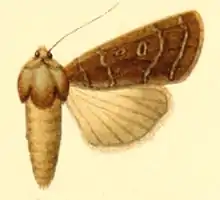| Spaelotis ravida | |
|---|---|
 | |
| Scientific classification | |
| Domain: | Eukaryota |
| Kingdom: | Animalia |
| Phylum: | Arthropoda |
| Class: | Insecta |
| Order: | Lepidoptera |
| Superfamily: | Noctuoidea |
| Family: | Noctuidae |
| Genus: | Spaelotis |
| Species: | S. ravida |
| Binomial name | |
| Spaelotis ravida (Denis & Schiffermüller, 1775) | |
| Synonyms | |
| |
Spaelotis ravida, the stout dart, is a moth of the family Noctuidae. The species was first described by Michael Denis and Ignaz Schiffermüller in 1775. It is found in the Palearctic realm.
The wingspan is about 42–50 mm. Meyrick describes it Antennae in male ciliated. Forewings fuscous, towards costa rosy-tinged an obscure blackish median dash from base ; sub-basal, first, and second lines slightly paler, obscurely darker-edged, distinct on costa ; orbicular and reniform partly outlined with black, sometimes connected by a blackish mark or touching, orbicular rather elongate ; subterminal line pale, anteriorly with somewhat darker suffusion. Hindwings fuscous-whitish, darker posteriorly. Larva ochreous-brown ; dorsal line somewhat paler ; subdorsal series of curved or sometimes nearly straight oblique yellowish marks, edged above with dark fuscous ; head grey, fuscous marked. Adults are on wing from July to August.[1]

The larvae feed on Artemisia, Cirsium, Rumex, and Taraxacum species.
The species is suspected to have disappeared from the United Kingdom as a resident species during the first decade of the 21st century.[2]
References
- ↑ Meyrick, E., 1895 A Handbook of British Lepidoptera MacMillan, London pdf
 This article incorporates text from this source, which is in the public domain.
This article incorporates text from this source, which is in the public domain. - ↑ Platt, John R. (7 February 2013). "3 British Moths Extinct; Most Other Species in Decline". Scientific American. Retrieved 12 September 2013.
External links
- Kimber, Ian. "73.349 BF2113 Stout Dart Spaelotis ravida ([Denis & Schiffermüller], 1775)". UKMoths. Retrieved 10 July 2019.
- Lepidoptera of Sweden